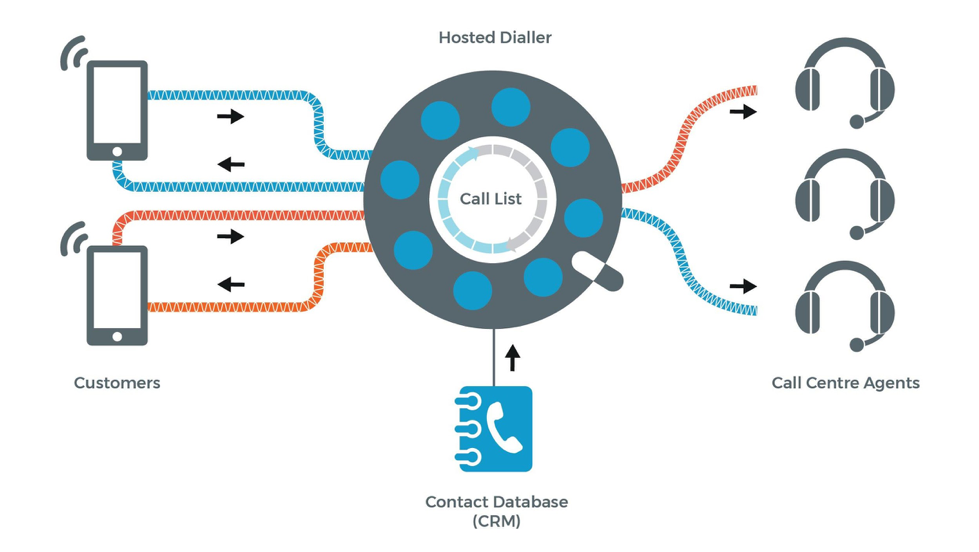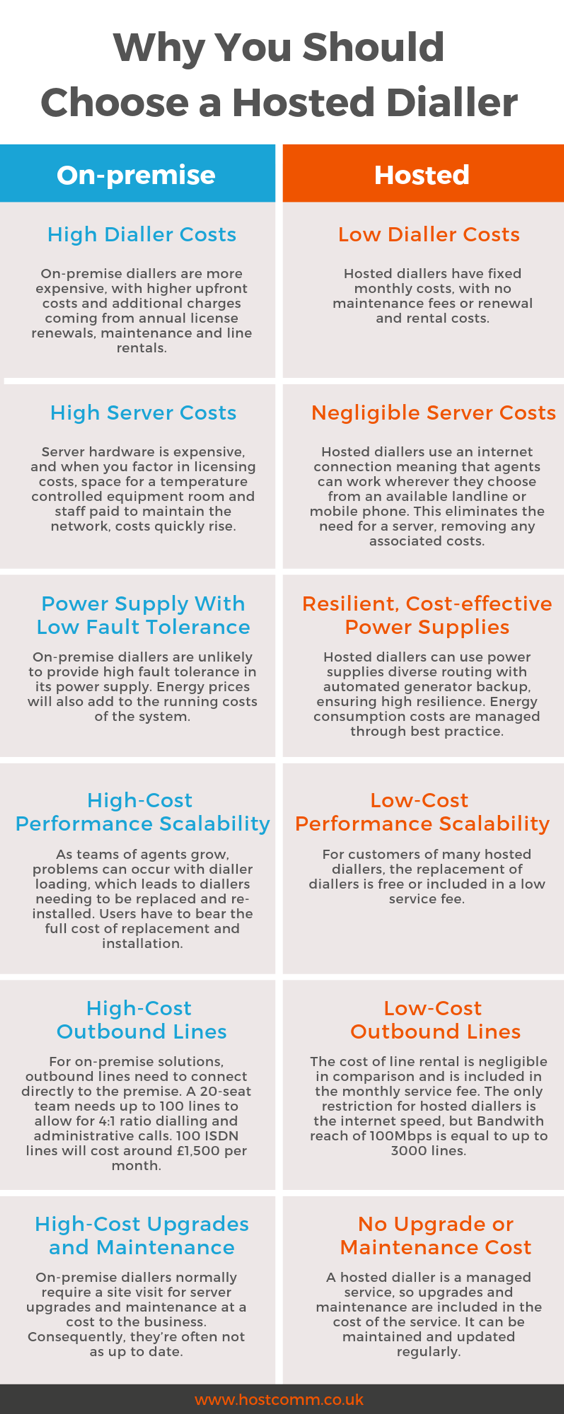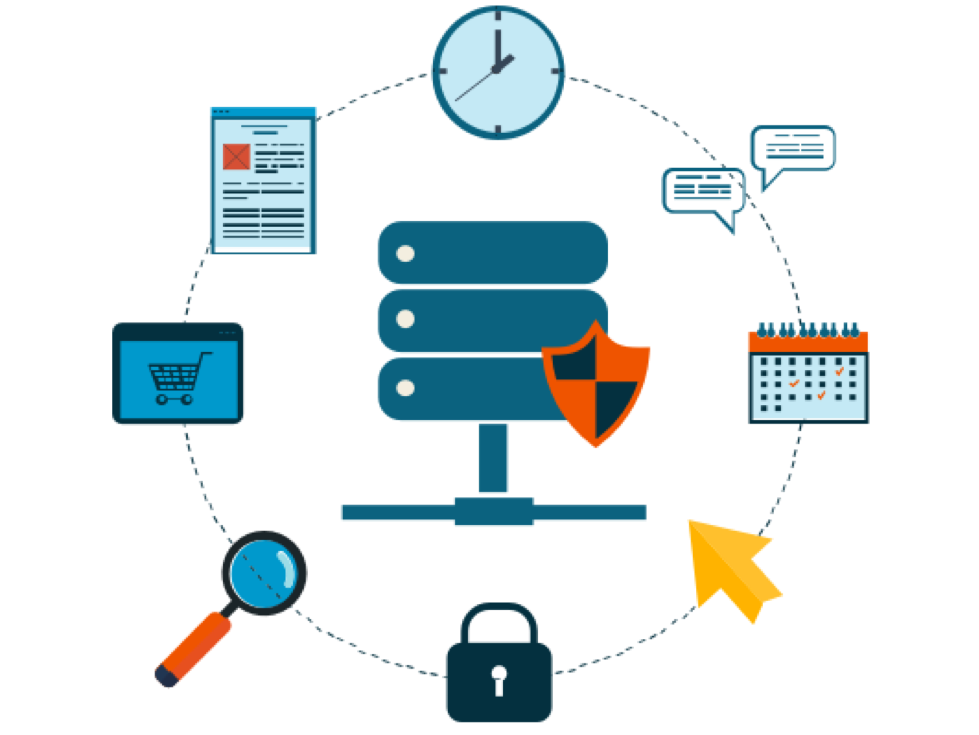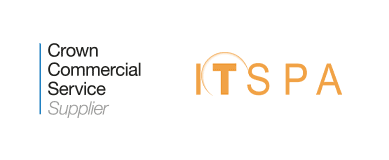When a company decides to use a predictive dialler, their objective is likely to be to increase productivity and efficiency at the lowest possible cost. A predictive dialler saves call agents a lot of time, as they will no longer need to dial numbers themselves, or wait for a caller to answer or a busy signal to be reached. Predictive diallers will be able to work out when the current call is about to end and put the agent through to another customer as the call concludes, thus saving time and increasing efficiency.
The objectives for predictive diallers are clear, but the way in which this can be achieved varies depending on whether an on-premise or a hosted dialler is selected. Each of these solutions has some pros and cons to be weighed up, so in this guide, we will explore each option so you can determine which is best for your business.
What Are On-Premise and Hosted Diallers?
An on-premise dialler has long been the traditional option for predictive diallers. On-premise diallers are an in-house setup owned outright by the company after paying an upfront fee to cover the hardware servers and physical diallers. On the other hand, a hosted dialler is a cloud-based telephony system that will be paid for month on month and can be accessed through the internet.

Advantages of On-Premise and Hosted Solutions
The main advantages of each solution are briefly outlined here:
Hosted
● Money is saved by not having to purchase servers and software.
● Monthly subscription instead of a large up-front cost. This means that costs are spread out, allowing for businesses to use the latest hosted dialler technology that they would otherwise not be able to afford.
● Implementation is fast, meaning companies can get started straight away, rather than needing to wait for hardware to be delivered.
● Flexibility and scalability to meet demand.
● Can be accessed from any location that has internet access, meaning that work can be completed from home, other offices or on the go!
On-premise
● Ability to monitor the physical service and take responsibility for the performance of the phone calls made.
● Client records are only transmitted across a local network, increasing privacy.
● Return on Investment is easily measurable as the system is paid for in an upfront cost.
● Compliancy updates can be installed when required and convenient for the user, rather than when the service provider chooses to.
● Additional setup of a VPN access can make the system accessible remotely.
While there are many advantages to both systems, it can be argued that hosted diallers are far superior in a number of ways. Costs are likely to be a key concern for most companies and hosted diallers are by far the more cost-efficient option.
Paying only a fixed monthly fee, companies can avoid having to waste money on renewal costs, rental costs, maintenance fees and expensive hardware and outbound lines. Furthermore, many businesses like using hosted diallers due to the fact that they can use cutting-edge technology, that they would otherwise be unable to afford to use if buying outright.
On the other hand, on-premise diallers require enough capital to cover the hefty upfront costs, which are often in the realm of £30,000! On top of this, the right expertise, infrastructure and maintenance required for the continued running of the system quickly see the costs building.
We outline some more of the key reasons why a hosted dialler is preferred over an on-premise dialler in our infographic below.

Keeping Your Dialler Online
A dialler can only bring value to your business if it’s online and operational when you need it. As a result, resilience is a fundamental quality of a useful dialler. For a dialler to stay online, three things are essential: the outbound comms circuit, server hard drives, and power supplies.
Outbound Comms Circuit
Your outbound comms circuit is the network that connects you to the wider world.
On-premise:
The outbound comms circuit is usually an internet connection or ISDN service. If either of these fail, the dialler will be out of action for at least half a day, leaving you with no inbound or outbound calls.
Hosted:
The outbound comms circuit is an internet connection. But if your primary internet connection fails, agents can work from home or an alternative office, a smaller group could resort to landlines, and inbound calls can be re-routed to a landline or mobile phone.
Server Hard Drives
Hard drives must be available at all times to support the dialler platform itself and the data you work with.
On-premise:
Your office is unlikely to be optimised for server hard drive performance. Meanwhile, the prohibitive cost of faster and more reliable solid state drives (SSDs) restricts you to conventional hard drives with moving parts that are liable to failure.
Hosted:
Housing your dialler in a shared, service-based environment means that more resources are available, including SSDs. Your server hard drives are stored in a purpose-built datacentre, complete with appropriate temperature control to ensure optimal performance.
Power Supplies
Every element of your dialler platform and infrastructure requires power to run.
On-premise:
Using a standard office power source, it is unlikely that you can provide several sources of power. If your primary power source goes down for any reason, your service is lost completely.
Hosted:
Datacentres are designed to keep devices online, 24/7/365. With diverse routing and automated generator backup, a hosted service can offer fault tolerance that can’t be matched in most offices.

Keeping Your Call Centre Data Safe
Aside from running costs and efficiency, another major factor that companies will want to consider is the safety and security of the system. With hosted diallers using the cloud to store all data, some companies can be wary of using such a system, believing that their customers’ secure information is at risk. However, this certainly isn’t the case.
Security Of On-premise Diallers
On-premise diallers give companies peace of mind that their data is secure. With an on-premise solution, you retain complete control over physical access and security processes. You can see the place where your data is stored, and that can reduce worries over a potential data breach. But the surprising truth is that a hosted dialler could actually be even more secure.
Security of Hosted Diallers
According to Symantec, cyber attacks on small businesses continue to rise. The data in your own network is potentially at a great deal of risk. Meanwhile, when you choose a hosted dialler from a reputable provider, you’ll be dealing with experts in IT, infrastructure, and telephony. These specialist companies depend on robust security to stay operational – so they invest heavily in securing your data, using the latest encryption standards, protecting against denial of service attacks, and keeping on top of the changing IT security landscape.
Why Don’t All Businesses Use Hosted Diallers?
Perhaps the biggest reason that businesses don’t choose a hosted dialler – despite the huge benefits and cost savings it could deliver – is because there is a leap of faith involved. When you choose a hosted services provider, you are trusting another company to manage your infrastructure, keep your dialler online, make regular updates, and maximise performance. Not all hosted dialler services are built alike. So while it makes sense for every business to move to a hosted dialler, it’s also vital to do your research.
Here at Hostcomm, we offer Hosted Predictive Dialler solutions that are regularly upgraded and meet all required compliance. As specialists in telephony and contact centre services, you can rest assured that our expertise can provide you with the best dialling service possible. We constantly monitor and carefully manage our networks to guarantee uptime and performance. In addition, we meet all required compliance, so you can call with confidence, always on the right side of the Ofcom guidelines and regulations. We also work to strict Service Level Agreements (SLAs), guaranteeing that your hosted dialler is available whenever you need it. Our servers and infrastructure are regularly upgraded, giving you the latest technology to support your organisation, without the need to overhaul an in-house implementation. If you would like to find out more about how a hosted dialler can benefit your business, then get in touch today.












